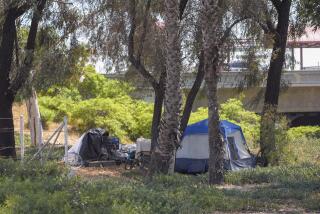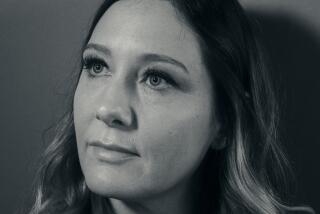Navajo Nation President Overcomes Alcoholism on Way to a New Life
- Share via
WINDOW ROCK, Ariz. — Little is left of the old Kelsey Begaye.
Once he was a drunk who cared about little more than his buddies and his next bottle of booze. He was a homeless man in Los Angeles who passed his days on park benches and his nights in shelters.
That he would rise to become president of the nation’s largest American Indian tribe seemed, if not impossible, certainly unlikely.
But more than two decades later, he did just that. And a year into his first term, Begaye says he draws on that former life in hopes of giving today’s Navajo youth the vision he lacked.
“You ask any Navajo on the streets where the Navajos are going. They’ll say, ‘I don’t know. I don’t care.’ I want that to be different,” he says.
Begaye grew up in Kaibeto, in the far western portion of the Navajo reservation, which spreads out across parts of Arizona, New Mexico and Utah. The 48-year-old was one of seven children.
He now has six of his own and has helped rear numerous nieces and nephews. He has a visible affection for children.
At an elementary school on the reservation, children rush up to him in the dimly lit hall, hugging and pressing around him like a basketball player who just scored the winning shot. He smiles and talks over the clatter of giggling children. He signs autographs until his two pens run dry.
His ease with this sort of celebrity status betrays a childhood he says he preferred to spend herding sheep: “I guess the happiest days for me were herding sheep because I could get away.”
Begaye, whose sisters called him Kellie, describes his home as alcoholic, but only when pressed does he identify the drinkers as his parents and other relatives.
“His brothers, they were into alcohol,” recalls Phillip J. Brown Sr., a former Navajo police officer in Kaibeto (pronounced KI-beh-toe).
It was a legacy that would be passed down to Begaye.
By the time he was in high school, Begaye was sneaking sips of liquor from bottles in his locker and was placed on probation.
While at an Albuquerque boarding school, he also dabbled in gangs.
Faded bluish tattoos still mark his hands: a dot smaller than a dime on his right and the word “CHOO-CHOO” on his left. He is hesitant at first to talk about them but later says “Choo-choo” was a gang name.
They are the only physical signs of the old Kelsey Begaye, the one who served but also partied in the U.S. Army.
Begaye spent 13 months “being Charlie’s favorite target” in Vietnam, carrying a radio on his back and experimenting with drugs in his off-time.
“Marijuana was like cigarettes,” he said. “Everywhere you went, there were drugs.”
Discharged in December 1971, Begaye returned to the United States. “By that time I lost control of my life.”
He went from job to job, quitting or being fired, until, at 24, he was homeless in Los Angeles.
He spent a year taking advantage of shelters, churches and sometimes his sisters until, hung over and bored, Begaye decided to hitchhike home.
He arrived in northern Arizona in November 1975 and kept partying.
Brown, the former police officer, says he remembers picking up Begaye and other drunks in Begaye’s hometown.
“We used to do a lot of arresting. I think he was one of the men that we would get a hold of in that condition. He was an alcoholic,” says Brown, who is now a local official in Kaibeto.
Begaye’s wife, Marie, remembers a drunken Begaye trying to sell her a watch in a parking lot one day. He said he was hungry, but when she offered to buy him a meal, he declined.
Her family told her that Begaye was a troublemaker, made crazy by his time in Vietnam.
Marie Begaye, a soft-spoken woman who began befriending Begaye after the parking lot meeting, says her family was convinced he would never change. She wasn’t so sure.
But he was transformed, he says, by his conversion to Christianity on Jan. 11, 1976.
He ended up at a Christian tent revival while suffering a violent hangover. His mother and aunts hoped one of the attendees could take him to the hospital.
Instead he went down the aisle and prayed. He says he left clean and has remained so.
More than 20 years later, Begaye speaks about his transgressions openly--an outgrowth of years as an alcohol and drug abuse counselor.
“I think Navajos are forgiving. They begin to look to someone who has been through it all,” he says. “My positive has outgrown my negative.”
His rise in politics started several years after his conversion. He was a local school official and eventually speaker of the Navajo Nation Council, the tribe’s legislative body. He was elected president in November 1998.
“I guess I wanted to make a difference. I just really wanted to come in and make things happen,” Begaye says.
Brown, the man who used to arrest Begaye, says he believes the new one can change things.
“When he was running for office, I really believed what he said,” Brown says. “I believe in him.”
More to Read
Sign up for Essential California
The most important California stories and recommendations in your inbox every morning.
You may occasionally receive promotional content from the Los Angeles Times.













